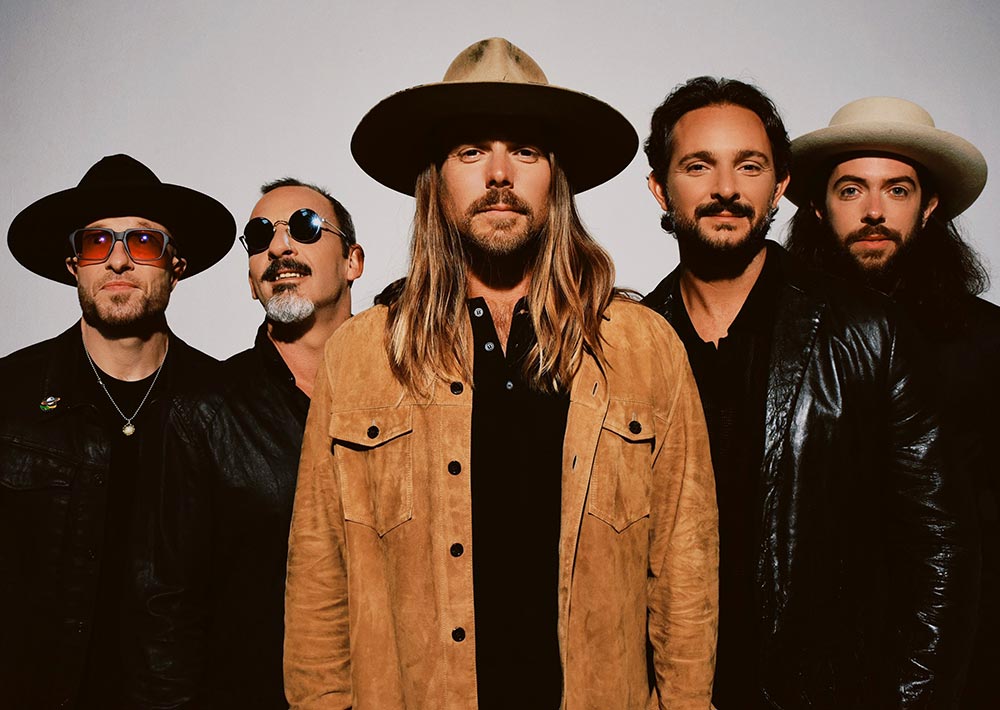
Lukas Nelson + POTR: “I know that I can hold my own songwriting and I’ve known that since I was a young kid.” Photo: Shervin Lainez
With the new POTR album ‘Sticks And Stones’ on the horizon, the country-rock superstar discusses his unbreakable commitment to songwriting
When the first song you ever wrote as an 11-year-old ends up being recorded by a living legend, you can probably say that you found your calling at a young age. The song was You Were It, the legend in question was Lukas Nelson’s father, country icon Willie Nelson. Don’t let parental pride take the shine off of Lukas’ inaugural gem, the dazzling career that’s followed proves it was nothing less than he deserved.
Together with his band, Promise Of The Real, Nelson has released seven studio albums straddling the borders of country, rock, and Americana. A particular highlight is 2021’s A Few Stars Apart: an introspective masterpiece imbued with the singer-songwriter soul of the early 1970s. For much of the 2010’s Nelson + POTR also had a close working relationship with Neil Young. Armed with the necessary riffs and love of a jam session, they stepped into Crazy Horse’s well-worn shoes, performing admirably as his live band and on studio records The Monsanto Years and The Visitor.
Now comes the new Lukas Nelson + POTR album, Sticks And Stones. With a rollicking first side balanced by the more reflective second half, the record reflects Nelson’s personal journey from wild man to relative clean living. They’re also songs that were born to be played live; to get fans up on their feet and make them forget their own troubles, if only temporarily. Keen to find out more about how the album came together, we caught up with the man himself…
Click here for more interviews
What comes first for you that the idea for an album or the songs themselves?
“A lot of times the songs come first I think, the idea of the album takes shape as we collect the songs and see what works.”
As the chief songwriter, how does it tend to work with regards to involving other people?
“As a band, when we decide we’re going to make a record, we go through all the songs I’ve written and we sort of say, ‘Hey, this is better than that one for this project.’ We have so many lists of different projects. I have a bunch of records that could be made and they’d be very different. I write a lot of different types of songs. There’s some more introspective and artistic material but this is the most fun and rollicking record I’ve made. I made it for the purpose of playing these songs live and having a big celebration of the human experience.
“I wrote this album when I was on the road. After A Few Stars Apart, touring on that record, which was a songwriter’s mellow album, I realised that a lot of people wanted to get up out of their seats and dance. I could sense that they wanted to rock and have a good time and sing along. So I wrote all these songs for this record with that in mind. Now I get to go play these songs live and it becomes a big party.”

Lukas Nelson: “I find that the music comes promptly and clearly when I take care of myself.” Photo: Shervin Lainez
What are the challenges and rewards of writing on the road compared to writing at home or in the studio?
“It doesn’t really matter where I write. I was looking at putting together the setlist every night and trying to figure out what songs to play, and I realised that there were some missing slots. I wanted to be able to play an upbeat song at this point in the set, and I didn’t have one… so I wrote one. That’s how it would go.”
And how similar are the finished songs on the album to the demos that you presented to the band?
“When everybody gets them, they’re all acoustic. They’re phone recordings that I do sitting on the bus. We then take them into the studio and flesh them out, bring the electric instruments into it and it changes.”
Can you try and capture the energy of your live shows in the writing and recording process?
“Record it live – that’s what we did. We got everybody in the room together, worked out the changes, and then said, ‘Okay, everybody do what you feel like.’ I have ideas and everybody else has ideas and we share them. Everybody in the band is pretty musical, I trust their ears. We’ve been together 15 years now, so we know each other musically.”
Although the album is fun and energetic, the second side felt a lot more poignant. How deliberate was that?
“This album is very autobiographical. The early songs represent my party days and then it moves up to the present, chronologically, in terms of the way my life has gone. That just came together; we had all these songs, we picked our favourites. In terms of arranging them – which songs work together – I liked the idea of the first songs being the fun party songs because I liked the idea that people hanging out with their friends and having a drink can throw on the first half of the record. All the way, for five or six songs, it doesn’t let up.
“It’s good for driving too, you can get started with a punch. It’s very dynamic. In fact, I think the record would be a pretty good setlist. If we played it straight, all the way through, it has peaks and valleys that would make up a pretty good show live.”
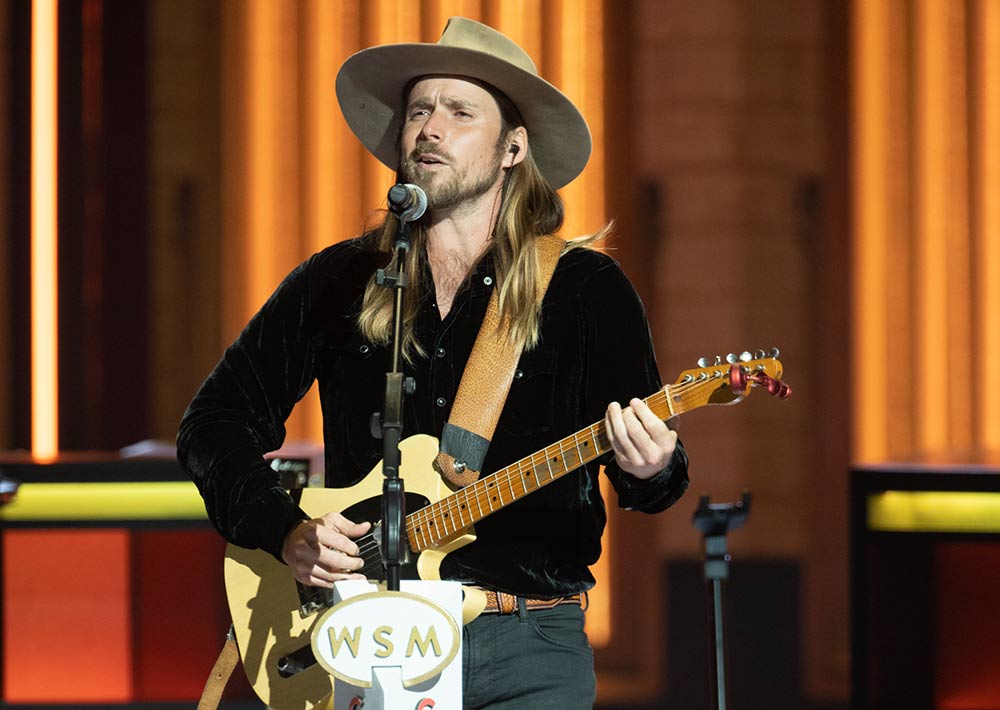
Lukas Nelson in Nashville: “The world needs human expression.”
How do you balance autobiographical songwriting with connecting to an audience and how do you make the personal universal?
“I feel strongly that we all share most human experiences. We have different perspectives, different upbringings, different lives, but we share love, we share heartbreak, we share these fundamental human experiences. So, the best way to connect to others is to really connect with yourself and be honest with yourself. Write honestly, what you feel, because chances are a lot of other people feel that way. We are, each of us, representations of a macrocosm or a collective. In the very Carl Jungian sense, I feel that there’s a collective unconscious mind.”
Is there a particular song that you could use as an example to walk us through that writing process?
“There’s a song called Lying. “I’d be lying if I said I didn’t wish that I was lying here with you.” I think everybody’s felt that. As a songwriter you say, ‘Is this song that I got from the heartbreak worth the heartbreak?’ There’s a line there that says, “Losing love ain’t worth the songs I write.” It’s a debate, ‘Do I want a song or do I want love and happiness?’ Historically, I’ve usually ended up with a song, but there’s still a lot of love there, too. That’s one of my favourites and I think that people can relate to that in their own ways.
“There’s a song called Forget About Georgia from one of our first self-titled albums. People really love that song, but it’s literally about me playing out with my dad. I mean, I talk about, every night with my dad playing our music. It’s sort of in response to the song Georgia On My Mind and it’s literally about playing that song with my dad every night. And then, you know, having this woman whose name was Georgia and having to forget about her while I sing this other song. So it’s very meta and very true to myself.
“No one else has that perspective of being out with my dad, other than my brother maybe, but it resonates so strongly with a lot of people. I find that fascinating, because it’s so unique to me and yet everybody seems to love that song, because they can apply their own experience to it.”
The first song you wrote ended up on one of your dad’s albums, how do you keep that creativity going and are there times you don’t want to do it?
“When I was young, I read a book about Muhammad Ali, called King Of The World. In the book he talks about every champion having something inside they know they can do as good or better than anyone else. Ever since I was a kid, as much as I love playing guitar, as much as I love singing, as much as I love performing, I knew that there was always a faster gunslinger out there; someone who could pick better than me, or had a wider range vocally, or could do a dance routine and choreograph. But I always knew that I could write a song as good or better than anyone else. I know that I can hold my own songwriting and I’ve known that since I was a young kid.
“I feel like if I have a gift, then that’s the gift I have to nurture. So I’ve nurtured that my whole life. And, thankfully, the gift and the muse is still there and still strong. I’ll never take it for granted.”

Lukas Nelson performing with Lainey Wilson at 2023 CMA Fest in Nashville: “I’ve never forced myself to write a song…I’ve also always waited for the inspiration to come and trusted that it would come.”
Have there been times when it’s been harder than others?
“I’ve never forced myself to write a song. I haven’t been in a position where I lack creativity or there’s some deadline where I gotta write a song by this time and I don’t have anything there. I’ve always got ideas. But I’ve also always waited for the inspiration to come and trusted that it would come. I never sit down and say, ‘Okay, I got to throw this together, because it’s just business.’ That’s not how I approach my songwriting. It’s not ever how I’ll approach my songwriting, because I think that it can damage the muse when you do that.”
Are there things that you can do to kind of in entice the muse into the room?
“There are many things you can do to help you get out of your own way. A lot of people use drugs, a lot of people use relationships, a lot of people use their own misery in some ways. Some songwriters, unfortunately, self-sabotage a lot of times. It goes back to, ‘I once had a heart, now I have a song.’ They feel that they’ll give up their heart and lives for the muse.
“While I’ve experienced most of that, in my current state of mind and being I don’t think I need it. I find that the music comes quite properly and clearly when I take care of myself and honour this vessel that I have. But right now, I don’t want to write too much, because I hate to see my songs sit around for years before they get on a record. I have a backlog of so many songs that I’ve been waiting to put on an album, and I have to just wait for each record cycle. There are hundreds of songs that I have sitting around. So every time I write a new one it’s like, ‘Well, okay, I’m not going to see that one for a long time.’
“I have to temper myself. When I need new songs for the next record I might write a bunch of new ones, and that’s great. But I’ve got to focus now on the songs that I’ve written that are on this album that we’re trying to get out to people.”

Lukas Nelson: “Songwriting is not bound by time, or age, or any of that.” Photo: Shervin Lainez
Do you have songs that you love but for whatever reason we’ll never get to hear them?
“I hope not. I hope I’ll live a long time and I’ll be able to put out different songs. I’ve flirted with the idea of, every time I write a new song just putting it out on Instagram and doing a live version of it, so I have it out there. Then going back and recording album versions of it.
“It’s a process for me. I’m 34 and I grew up before social media really took hold. A lot of these younger folks now, automatically everything goes online. I have a hard time grabbing my phone and saying, ‘Alright, here’s what I’m gonna do,’ and talking to people. I’m just not good at that, but I’m getting better at it. When I write a song, it’s so personal, I fear just throwing it out there because I want to present it in the best possible light.”
Returning to what you were saying about the Muhammad Ali book and knowing what it is you were meant to do in life… does that mean if you’re coming to music or songwriting later in life and didn’t have that feeling, it’s not going to happen for you?
“I don’t know that it’s not going to happen, I would never say that about anybody. Songwriting is not bound by time, or age, or any of that. There are a lot of amazing songwriters in Nashville that are older, and they write for young artists, and they get a lot of money that way.
“Now, you know, it depends on what you want. If you want to make it your career and make a living doing it, there are definite steps you need to make that require you giving up everything else in some ways – going out, making connections in towns like Nashville. But the thing about it is, you wouldn’t want to do that unless you were very sure of your own talent. Not just, ‘I think I’m good and my mum says I write well.’ You want to make sure that you can play the songs for others that don’t know you and have them be significantly moved by the songs.”
Is that how you view songwriting?
“Songwriting is so free, it’s like visual art. An artist is an artist because they are compelled to make their art. An artist doesn’t make art for money and an artist doesn’t make art for fame, they make their art for their art. You can be an artist and still have a nine-to-five job. The more you put into it, the more you challenge yourself, the more that you hone in on the skills that you’re building, it will only be rewarding to you. There’s no downside to that. It’s a win-win to make art.
“Even if you have perceived failures, if you choose to learn from those lessons then there’s no downside. The world needs human expression. Especially now in the days of AI and the machine-learning invasion that is happening. I think it’s important that we propel our artistic visions as organic human beings.”

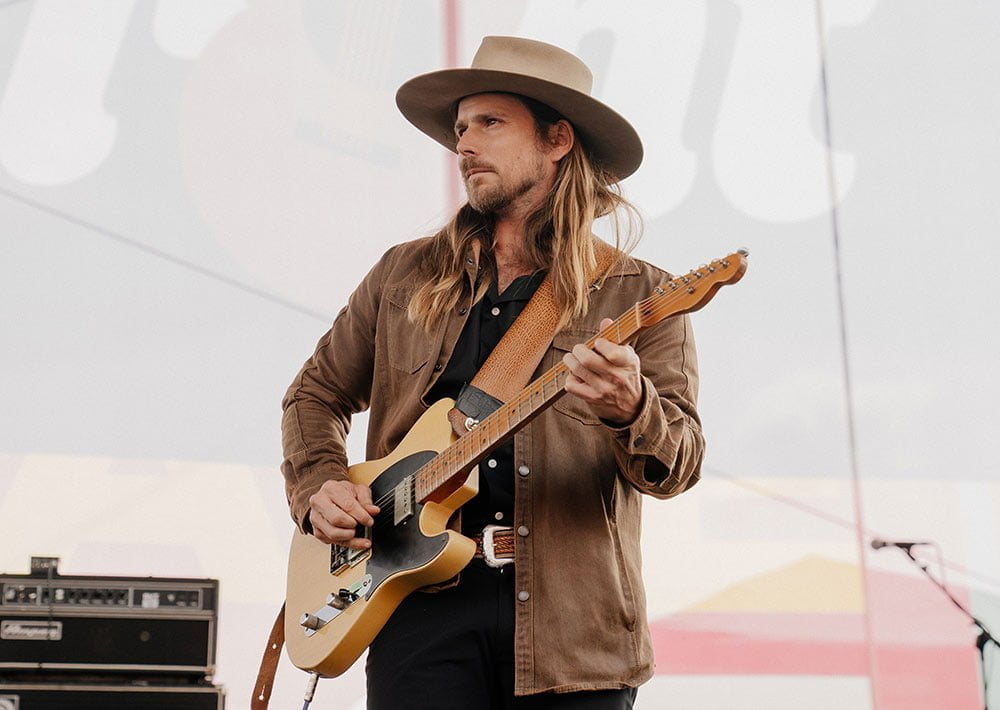
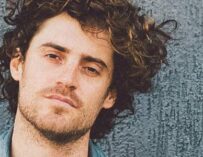
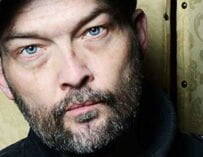



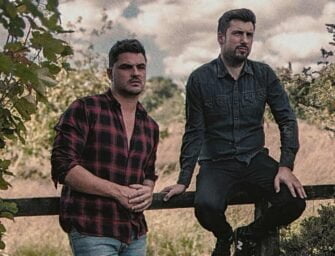

![Songwriting Credits… best new music playlist [September 2023]](https://www.songwritingmagazine.co.uk/wp-content/uploads/songwriting-credits-september-2023-335x256.jpg)






























Related Articles